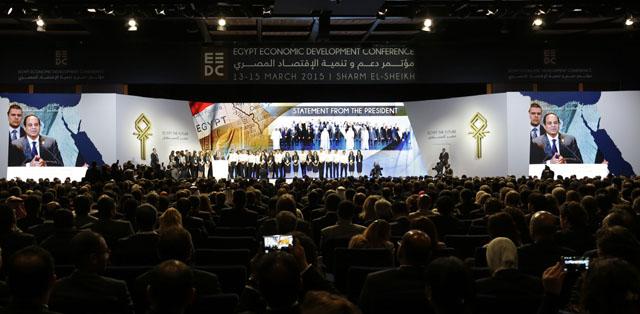You are here
Egypt to cut fuel subsidies as gov't seeks to cut deficit
By Reuters - Apr 10,2016 - Last updated at Apr 10,2016
CAIRO — Egypt will reduce spending on fuel subsidies by nearly 43 per cent in the 2016/17 budget due mainly to lower global energy costs, officials said on Saturday.
Finance Minister Amr Al Garhy told a news conference state energy subsidies would fall to 35 billion Egyptian pounds ($3.94 billion) from about 61 billion pounds in the 2015/16 budget.
Consumers reacted angrily when the government cut spending on energy subsidies in mid-2014, a measure that caused domestic prices of natural gas, diesel and other fuels to rise by as much as 78 per cent. They were reduced again in the current budget.
However, the deputy finance minister for fiscal policy said a decline in international oil prices would account for the bulk of the reduced subsidy spending in the next fiscal year.
"Most of the savings in petroleum product subsidies will be a result of lower global oil prices," the deputy minister, Ahmed Kojak, told Reuters.
"There is also a saving of about 8-10 billion [Egyptian] pounds that will come as a result of new reforms that the petroleum ministry will outline in agreement with us," he added.
Egypt is struggling to revive its economy since a popular uprising in 2011 shook investor confidence and drove tourists and foreign investors away. Its foreign currency reserves stood at $16.56 billion in March, down from about $36 billion in 2011.
The government has been trying to cut subsidies, which eat up a big chunk of the budget.
President Abdul Fattah Al Sisi has approved a draft state budget that reduces the budget deficit in the 2016/17 fiscal year to 9.8 per cent of gross domestic product (GDP) from the current 11.5 per cent.
Separately, Egypt is confident of luring back millions of foreign visitors and putting a smile on their faces, according to its new tourism minister, despite heavy first quarter losses and setbacks including a bomb that brought down a Russian passenger plane.
Yehia Rashed said the ancient land of the pyramids and Red Sea resorts was determined to secure a strong recovery even though the number of foreign tourists fell by 40 per cent in the first quarter of 2016, compared with the same period last year.
The most populous Arab nation aims to attract 12 million tourists by the end of 2017 with a six-point plan, he added.
"I am very hopeful, optimistic about the future of tourism into Egypt," Rashed told Reuters in an interview. "I want to get that smile that you are smiling into the faces of everybody. We want to stay positive."
Egypt tourism revenue has taken a heavy hit since a Russian plane crashed in the Sinai last October, killing all 224 people on board in what President Sisi called an act of terrorism.
Rashed assured that Egypt had improved airport security since the crash.
"These people have worked day and night," he stressed. "Egypt is safe."
The torture of Italian graduate student Giulio Regeni, whose body was dumped on the side of a road in February, has also hurt Egypt's image.
"We care big time about human rights. The best way, actually, is to create positive vibes in the mind of people that Egypt is safe and it is worth visiting," he said.
Hurting earner
Egypt's tourism industry, a cornerstone of the economy and critical source of hard currency, has been struggling to rebound after the political and economic upheaval triggered by the 2011 uprising.
More than 14.7 million tourists visited Egypt in 2010, dropping to 9.8 million in 2011.
"The first quarter is down about 40 per cent compared to last year. However, there is a positive with every negative. The Gulf business is up about 45 per cent from last year," Rashed indicated.
Egyptian tourism has survived hard times in the past.
In 1997 militants killed tourists at a temple in Luxor, on the Nile.
Rashed seemed optimistic. He said the new six-point plan to boost tourism would include increasing the presence of national carrier EgyptAir abroad, working with low-cost airlines and the improvement of services.
Asked how the state would fund these projects, he said:
"We are not doing new things what we are doing is stimulation programmes. Taking from the current funding and putting it into where our bread and butter is," Rashed explained. "We don't have the figures of the total cost of this. We are currently working on the costing."
Related Articles
President Abdel Fattah Al Sisi was so confident after Egypt signed billions of dollars of deals at an investment summit that he publicly joked on Sunday about haggling with the world's top chief executives. Yet the real challenge has only just begun.
CAIRO — Egypt on Thursday said it had a primary budget surplus for the first time in 15 years and said it was committed to paying oil compan
CAIRO — Annual consumer price inflation in Egypt's cities soared to a second straight eight-year high in December, hitting 23.3 per cent on



















